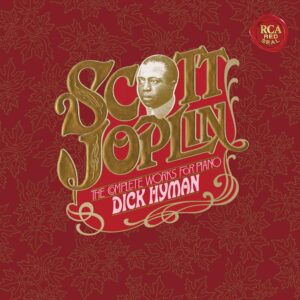The ragtime genre came into full flower from the mid-1890s through the end of World War I, spearheaded by Scott Joplin (1868-1917), whose 1899 composition Maple Leaf Rag became the template and standard bearer for classic through-composed rags. The late 1960s and early 1970s saw newfound interest in Joplin as a serious composer, starting with the New York Public Library’s publication of Joplin’s collected works. Joplin’s 1902 rag The Entertainer figured prominently in the soundtrack for the 1973 Academy Award-winning film The Sting, launching a floodgate of Joplin releases. Even classical artists as unlikely as Itzhak Perlman, James Levine, and E. Power Biggs hitched their stars to the Joplin bandwagon.
However, the most comprehensive, intelligently produced, respectful, and artistically satisfying collection of Joplin’s complete piano works came from RCA Victor in a five-LP boxed set, featuring pianist Dick Hyman. No better Joplin cycle exists, and its first complete appearance on CD is long overdue.
The music is presented by genre, with the rags arranged in loose chronological order by composition, followed by marches and waltzes. Also included is Joplin’s charming “School of Ragtime” Etudes complete with Joplin’s introductory remarks read by composer/pianist and Joplin colleague Eubie Blake, who was 92 when he faced the microphone to speak. Hyman also offers the Grand Crush Collision march both in its original text and in his own ragtime transformation.
Although Hyman’s pianism embraces the entire history of jazz piano, his effortless virtuosity is firmly rooted in classical training. As Rudi Blesh aptly stated in his brilliant and insightful original booklet annotations, the pianist “takes ragtime seriously without becoming solemn and portentous, more as one must do in approaching, say, much of Mozart.”
Two further qualities make Hyman’s Joplin stand out: his intelligent tempo choices, and his ideal fusion of classical projection and jazz time keeping. Take Joplin’s 1899 hit Maple Leaf Rag, for example. Hyman’s vigorous pace, dynamic contrasts, and clear articulation convey pure joy with a soupçon of brashness, so unlike Joshua Rifkin’s effete and rhythmically stiff traversal. The Cascades’ descending runs are as crystalline and transparent as Rubinstein’s Chopin. By contrast, Hyman’s measured tempo and ear-catching inflections of phrase in Elite Syncopations give shape and breathing room to Joplin’s polyphony.
Note, too, Hyman’s lovely legato touch and subtly lilting rubatos in Weeping Willow, Gladiolus Rag, and Solace, while Something Doing is pure lightness and effervescence. The pianist’s characterful animation keeps the episodic Bethena concert waltz afloat and moving. And although Hyman clearly respects Joplin’s texts, the pianist is not above filling out the texture with discreet octave reinforcements in the left hand, as he does in the difficult Euphonic Sounds, a rag that foreshadows elements of stride piano. Because Hyman approaches each piece on its own terms, one gleans more variety and expressive scope from Joplin’s oeuvre than we experience from most other Joplin interpreters.
The original LP edition devoted the tenth side to twelve of Hyman’s improvisations on Joplin themes, which here are spread across the three CDs, most likely for timing considerations. They are sheer delights, from The Entertainer’s bi-tonal coda to a brief and unbuttoned Peacherine Rag that brilliantly burlesques Art Tatum’s 1940 recording of Harold Arlen’s Get Happy.
A Breeze From Alabama is pure, unadulterated barrelhouse and boogie-woogie, while in Joplin’s New Rag Hyman can’t resist interpolating Juventino Rosas’ Over the Waves–better known as the summer camp ditty “George Washington Bridge”. In short, Dick Hyman and Scott Joplin unquestionably belong to the coterie of symbiotic performer/composer pairings that include Schnabel/Beethoven, Gould/Bach, Gieseking/Debussy, Larrocha/Albéniz, and Hamelin/Alkan.
Full disclosure: I met Dick Hyman nearly 60 years ago when I was eight years old, and he has been a friend, a colleague, and a musical father figure to me ever since. We even played two pianos together in several concerts. I vividly remember hearing Dick preparing these Joplin pieces at the time of the 1975 sessions, and marveled at his absolute commitment to the material, his focus and his flexibility in the process of getting all of the music under his awesome fingers. Thanks to Sony/BMG for reissuing and gorgeously remastering an important recording project that belongs in every serious collection.
































